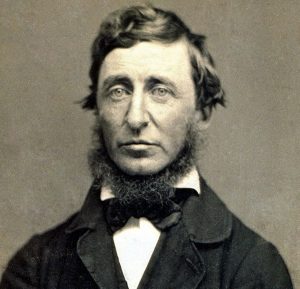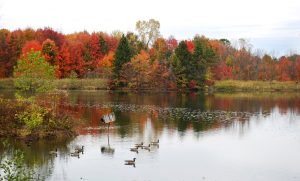
Two hundred years ago, on July 12, 1817, Henry David Thoreau was born in Concord, Massachusetts. This famous American author, transcendentalist, naturalist, political dissident and human rights advocate inspired the names behind Walden Waterfowl Refuge and Thoreau Lake at Blendon Woods.
Thoreau is best known for spending more than two years in a cabin in the woods near Concord. While there, he spent his time writing, learning to live simply, becoming self-sufficient and understanding society through personal introspection. His time in the cabin led to his most famous book, “Walden,” first published in 1854.
Throughout his life, Thoreau seemed to think ahead of his time. Many of his thoughts, concerns, writings and advocacy work dealt with issues that were in the political forefront in the 1900s and even today into the 2000s. As an abolitionist in the late 1800s, he helped slaves escape in the Underground Railroad. He also spoke out on women’s rights and Native American rights. He refused to pay specific taxes, because he opposed the Mexican-American war. Thoreau had an issue with the Industrial Revolution, believing that the toxic and dangerous conditions inside and outside factories were bad for humans and nature alike.
As a result, Thoreau took to the woods to sort out all of these emotions and thoughts. He built a cabin on Walden Pond, a property near Concord, owned by fellow writer Ralph Waldo Emerson. The book “Walden, Or Life In The Woods” chronicles his time in the cabin. Thoreau, living in the woods in the mid 1800s to become one with nature, was considered quite strange. However, his descriptions in the book of all things nature – plants, animals, life cycles, protection and preservation of wildness – has inspired generations of naturalists and environmentalists.

The Walden Waterfowl Refuge now consists of 118 acres of protected forests, fields and Thoreau Lake, which is managed to attract waterfowl. In the winter, there are bubblers that keep the lake water moving to prevent ice from forming. When temperatures are below freezing, park staff put corn out for the ducks and geese to eat. Bird nest boxes are placed strategically to attract bluebirds, wood ducks, and mallards. Two observation shelters allow visitors to hide and watch all of the natural action.
In “Walden,” Thoreau writes that going into nature is a spiritual journey and it is a call for people to step out of the rat race and follow nature. He stressed simplicity. Today, many people come to Metro Parks to do just these things. We think that Henry David Thoreau would feel very comfortable visiting our Metro Parks and would be a vocal promoter of our park system.
Happy 200th birthday, Mr Thoreau. We are proud to bear your name here at Blendon Woods.
BRUCE SIMPSON & ANDREA KRAVA
Blendon Woods Naturalists
